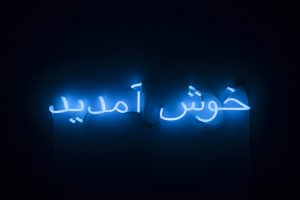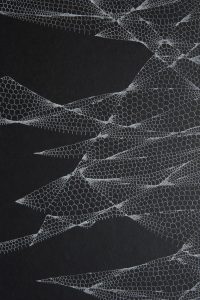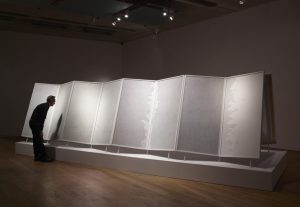Waqas Khan
Gifted, enigmatic, inspired – Pakistani artist Waqas Khan’s unique abstract geometric drawings form part of important museum and private collections across the globe. His latest work is on display at the Manchester Gallery as part of a collaboration with artists in the UK, India, Pakistan and Bangladesh to mark the 70th anniversary of independence.
His work is composed of tiny, delicate dots, lines, and circles – drawn on wasli paper – that expand and transform into magnificent organic, networked shapes. Each line, each dot is unique – skilfully and precisely drawn during days and months locked away in a Lahore studio, through an almost yogic like process in which the artist matches his breathing to his pen strokes.

At the entrance of the Manchester Gallery, a neon sign in Urdu script – Khush Aamdeed – especially created by Waqas, bids you welcome. Once in to the exhibition, there are monochromatic drawings in red, blue, white and black ink and a large floor based work, its intricacy contrasting dramatically against its expansive size.
It’s captivating work, transfixing the beholder momentarily in the passage of time. The drawings are beautiful in form, with an ethereal fragility to the delicate cobweb like structures, which seem at once to embody universes of stars, moons, planets, people.
Designed to evoke meditative reflection – and as Waqas later tells me, as an invitation to experience ‘peace’ – there is an undeniable mystical quality to the drawings. Waqas has spoken about the inspiration he derives from Sufism, and its ideas about the multiplicity and unity that exists in the natural world as a reflection of the Divine.

On the symbolism of the dots and dashes, for example, Waqas says: “(They) are units which represent us. In their totality they indicate the possible impact the element of togetherness can bring. For me they symbolise ‘oneness’, the power of having one unanimous thought. The power of agreement.”
Waqas Khan began his journey at Lahore’s National College of Art, where he trained in printmaking and miniature painting. I first came across his drawings in London, late 2013 when he was shortlisted for the Jameel prize at the V&A Museum, which is awarded to contemporary artists and designers inspired by Islamic tradition. Today, he is compared to modern Western artists, most recently Rothko and Mondrian by the Guardian’s art critic Jonathan Jones, who has also called his work ‘perhaps the greatest abstract art of our time‘.
So how does he feel about the comparisons? “I am humbled obviously”, Waqas says. “They are great masters and their work left an impact on the world. If I speak in particular about Rothko, it is the absence of materiality in his work, and the elevation of feeling which I can relate with. If anything, that is what I want my work to do – generate feeling, and make you step within your own self instead of looking for educational parameters to understand it.”
This immersive, emotionally invigorating, breathtaking show – a tranquil escape from the machinations of daily life – certainly lives up to the artists hopes for it. Go see it to believe it.
When: Saturday 30 September 2017 – Sunday 25 February 2018
Where: Manchester Art Gallery, Mosley Street, Manchester M2 3JL
More information: Manchester Art Gallery
Photos courtesy Galerie Krizinger, Vienna; Sabrina Amrani, Madrid; and Manchester Art Gallery
This article was produced for Funoon London, an award winning digital platform.
